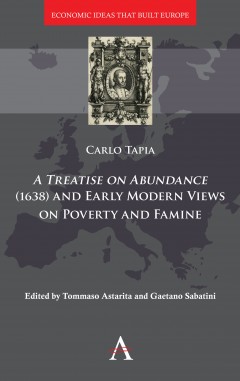A Treatise on Abundance (1638) and Early Modern Views on Poverty and Famine
By Carlo Tapia
Edited by Tommaso Astarita & Gaetano Sabatini
Economic Ideas that Built Europe Anthem Other Canon Economics
Other Formats Available:
- About This Book
- Reviews
- Author Information
- Series
- Table of Contents
- Links
- Podcasts
About This Book
‘A “Treatise on Abundance” (1638) and Early Modern Views of Poverty and Famine’ is an edited English translation of Carlo Tapia’s ‘Trattato dell’abondanza’.
Tapia (1565–1643) lived and worked in Naples, at the time the largest city in Italy and in the Spanish global empire, one of the three largest cities in Europe and a major center of artistic, musical and intellectual life in Baroque Europe. Tapia had a very distinguished career in the Spanish administration of the Kingdom of Naples and of Spanish Italy, generally serving in many offices across the kingdom, in Naples itself and in Madrid where, in 1612–24, he was a member of the Consejo de Italia (Council on Italy), the Spanish monarchy’s pre-eminent body to govern its various Italian possessions. Tapia had deep classical and juridical knowledge, and also rich experience as an administrator, including at the local level, all of which he brought to bear in the ‘Trattato’.
In the ‘Trattato’, Tapia tackled the question of how to provision the city with essential foodstuffs, a central issue for all early modern governments, and more generally the issue of how to prevent or combat famine across the kingdom’s largely rural provinces. The treatise represents the earliest systematic attempt to develop and publicize the most effective tools available to governments to fight famine and poverty. In particular, Tapia moved the discussion of these issues away from traditional religious approaches and aimed instead to offer both a theoretical understanding of the issues (based in part on his study of both classical sources and contemporary legal theories) and practical advice that could help administrators both in the provinces and in the capital.
Reviews
Author Information
Series
Table of Contents
Links
Stay Updated
Information
Latest Tweets



